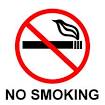The General Assembly is considering a measure that will specifically prohibit smoking on public school property, indoors and outdoors.
Any individual, who violates this law, when passed, will get a first offense warning that tells the individual of the prohibition requirements. If someone gets a second offense warning, a civil penalty of $50 will have to be paid for each violation after that.
The bill defines smoking as “the burning of a lighted cigarette, cigar, pipe, or other device or substance that contains tobacco.”
The current law made before this bill, was that each local school system has to have a tobacco-free school environment. Most schools are already tobacco-free for students, but they excluded teachers or didn’t specifically mention teachers and staff.
Since teachers and staff had designated areas on school grounds to smoke, they could do so. This bill might’ve been proposed because parents seen that teachers and staff was smoking near their children.
The previous bill never directly stated no smoking at all is allowed on the property and school grounds. This bill was proposed to clarify to everyone who smokes, that it is not allowed anywhere on the school’s property.
The bill doesn’t directly affect any State operations or finances. Locally, if County Boards of Education wanted to prohibit smoking on school property with existing rules that are already in place, than they have the right to do so.
The bill had three amendments made to it and had its most recent hearing on March 19. The first amendment was emphasizing the fact that a County Board of Education has the right to prohibit smoking.
Before this was amended it read that “an individual may not engage in” smoking. The older way the bill was written put more focus on an individual and the new amendment puts more emphasis on the officials.
The second amendment was adding Senator Forehand to the sponsor’s list. At first, Senator Bobby Zirkin was the only sponsor, but now Senators Zirkin and Jennie Forehand are sponsoring the bill.
The third amendment was clarifying the penalties for each violation, if someone smoked on school property. It has been proven that children are more susceptible to getting diseases and other harmful side effects of people smoking near them or in the general area around them.
Children are almost always at schools, so the fact that students could possibly walk past teachers and staff where someone has been smoking is potentially harmful for the students. Studies show that the likelihood of long-term health issues is more common, the younger the child is.
Examples of diseases that can result fairly easily from smoking around young children are asthma, emphysema, and lung cancer. The fact that smoking also releases a lot of toxins, causing the person or people smoking to smell like cigarettes or cigars, is important.
If teachers come to school smelling like cigarette smoke, a student could easily inhale some of those fumes and get sick. Senator Forehand doesn’t want that happening.
Kathy Dunn, Chief of Staff for Senator Forehand, handles some of the work that Senator Forehand can’t get to when the senator is busy.
“Senator Forehand has a long history in fighting smoking,” said Dunn.
Forehand said that her father never smoked, but was exposed to second hand smoke at work. He worked at an engineering office.
He unfortunately died of lung cancer. Senator Forehand worked hard to propose as many bills as she could that related to smoking in general and secondhand smoking.
“As a result of Senator Forehand’s efforts, the Maryland General Assembly banned smoking,” said Dunn.
Also, the Orioles stadium only got state funding once an agreement was made to make it smoke free, thanks to Senator Forehand.
###
